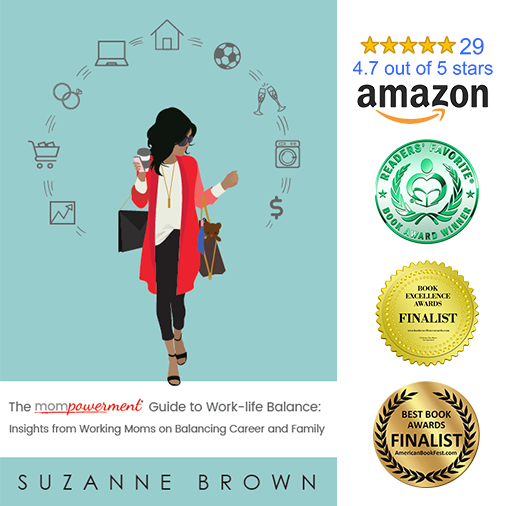
It was such a treat to chat with Darien Sutton who works in the financial services industry. I loved hearing about her experience at Dixon Hughes Goodman (DHG), a public accounting and comprehensive financial consulting firm that values flexibility for its employees. It made sense to share more of Darien’s story and that of DHG since they are a balance-friendly company during a month when I’m specifically talking about the transition to a professional part-time role. (And it’s never a bad idea to share Darien’s story as an inspiration for finding a part-time role you love.)
I’ll even mention that since interviewing Darien a few years ago, she has since been promoted. So, if you’re thinking that working in a part-time capacity limits your growth opportunity, think again!
Professional Path
While many people in accounting and financial services study accounting, finance, or economics, Darien took a very different path. She graduated with major in English and a minor in Chemistry. Growing up in a family of medical professionals, she planned on going into the medical field. Just before taking the MCAT, though, Darien realized she wanted something different.
After completing her undergrad studies, Darien enjoyed some downtime. The real world could wait a few months. She backpacked in Europe and had an epiphany during her travels. Darien realized that she wanted to get an MBA, but she realized that she needed to get experience before taking that step. (I’ll add that most MBA programs require you get at least 2 years of experience although the average is 5-6 years.)
She worked as a customs broker for a few years post-undergrad and then she did go back and get her MBA with a concentration in finance and accounting. She landed her dream job after grad school in corporate finance at ExxonMobil. She had lots of responsibility and really enjoyed the work.
Sometimes life throws you curve balls, though. As Darien’s husband was finishing up med school, they prioritized his opportunities for residency programs. And at the same time Darien realized there were other types of opportunities in other industries, so she transitioned to a financial services company. Throw into the mix that Darien had just found out she was pregnant with their first child.
Here’s another myth that Darien sets straight: you can get hired coming back from maternity leave in a job you love. Darien interviewed for her next role while on maternity leave, which ended up being the company she’s now been with for more than 6 years. About a year into working for DHG, she found out she was pregnant with her second child.
As she returned from maternity leave, she talked to her manager and lead partner about going back part time. Their response was a resounding, “No problem. We will make it work.”
Do the math and you’ll see that Darien had two children under two as she returned from maternity leave. Having a second child is tough. Two under two is a handful. It’s not uncommon for working moms to start looking for information on the transition to a professional part-time role after their second child. Life becomes much more complex with a second child.
Support from your employer
Darien admits that she gets the flexibility she has asked for because her employer fully supports this approach for employees. They invest time and energy in their employees and want them to return post-maternity leave. They were likely even more interested in having her stick around because she’s a top performer. She knew this about the company, though, because of her initial interactions. And she plans on sticking around, in part because of the flexibility that company provides (OK, plus that whole be in a part-time role you love thing).
Work time
Initially, Darien negotiated with DHG that she would work 40 hours per week, which is about 90 percent of the average consultant’s time for the firm. Some parts of the year she works roughly 30 to 35 hours and during the busier times she works 45 to 50 hours a week. She has flexibility so that she can make up time at night when kids are asleep if necessary.
At one point along the way, Darien tried to go to a 70 percent schedule, but that didn’t work. She’s now around 80 percent, after three years into things. That put her at about 36 hours per week on average. Sometimes you need to try things out and trial and error will help you find the right level of hours for the work that needs to be done.
As part of the overall arrangement that Darien and the company agreed to, she has some flexibility, even with her reduced schedule. She works Monday, Wednesday, and Thursday at the office. Tuesdays Darien works from home (her nanny works there for the day). She doesn’t actively work on Fridays, although she’s available via email if needed. Darien also changes things up a bit in the summertime to take advantage of spending more time with her girls.
Benefit of Working in a Part-time Role
Yes, Darien works in a part-time role she loves. That in itself is a big benefit for many. There is more, though.
Darien shared that when she worked full-time, all the kids’ stuff was packed into weekends. She has more mental space in addition to time with family now. She’s able to take the kids to and from school. She can participate in kids’ activities.
On a more personal note, Darien feels like the craziness has stopped. She has more opportunity for doing lots of things for herself, not just her kids. She’s able to focus more on her own health and passions. For example, she’s started teaching exercise classes at the local YMCA.
She also gets to be active in areas that she’s passionate about. She’s been on the board of the Down Syndrome Association of Greater Winston-Salem for about 3.5 years at this point.
So, as you can imagine, Darien suggests considering and negotiating this option if it’s available. And, even if it’s not, you can always be the first within your firm.

Challenges of Part time
In Darien’s case, she shares that she takes on more at home. Her husband works a lot of hours. It’s also a challenge to go back and forth between the work and family mindset with her current schedule. It’s also not easy to work in a part-time role. It takes work and effort. In fact, Darien says, “it’s more challenging to do a part-time role than I thought it would be. If you want to take on a part-time role, you must be ready for that. The juggle doesn’t go away.”
She also adds that it’s helpful to have a supportive husband who is hands-on when he is around. He’ll take on kid duty on the morning each week when Darien aims to go in early. He makes the effort to be a partner for Darien to ensure she can carve out time.
Advice
- Ask for what you need from your manager/employer. If you don’t ask for what you want and need from your employer, it won’t happen. The worst they can do is say no and that might be sign that company isn’t right fit for you.
- Have a weekly check-in. Schedule a time each week to chat with your manager to see how things are going. Make any adjustments as necessary, based on how things are going and what you both share in these weekly conversations. As a manager, carve out the time to meet with your team so they understand your schedule as well.
- Track your hours on a spreadsheet. Keep track of your time and know your average hours over time.
- Learn to compartmentalize. Be present so that you focus on work at work and home at home.
- Take advantage of your flexibility. Manage your time to make most of it. For example, if you need to, make up hours after kids go down for bed.
- Have childcare to get work done if working from home. Getting work done when you’re working from home with kids is really challenging. Make sure to have childcare, whether that means having someone watching kids at home or managed care for children who are not yet school age.
- Be deliberate with your time. Use your time wisely, based on your priorities. Be diligent about time management. Darien shares a lot more about this on the DHG blog.
Darien didn’t specifically give this advice, but it came across loud and clear. It’s a lot easier to stay engaged as a top performer when you’re in a part-time role you love as an employee. Consider that as you look at your opportunities with your current employer and future opportunities.
Interested in seeing more from professional part-time working moms like Darien? Buy your copy of Mompowerment: Insights from Successful Professional Part-time Working Moms Who Balance Career and Family on Amazon today. (affiliate link)


